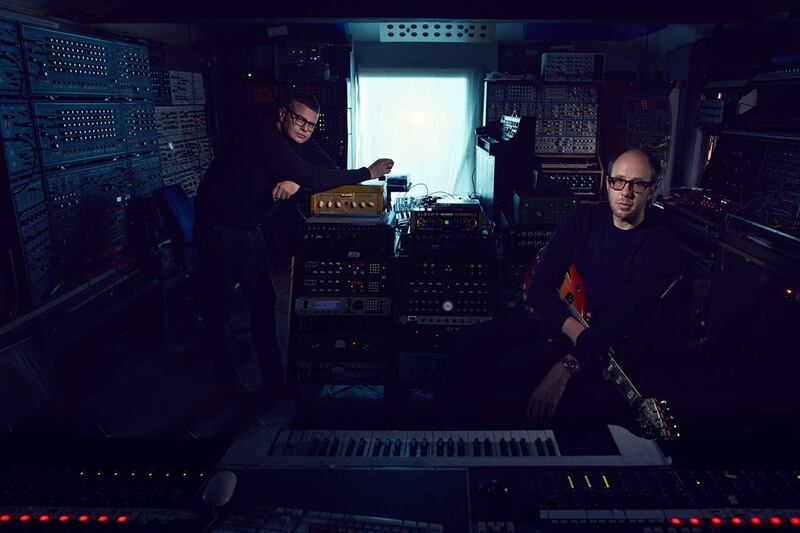How did they do it? How can it be that two decades after the fabled 1990s “big beat” boom – arguably the moment electronic music truly crossed over to the British public at large – The Chemical Brothers are the tallest tree from the era still standing?
Their contemporaries might have sold more records, but today Fatboy Slim is a touring party DJ producing very little new music, while The Prodigy were written off as an adolescent excess more than a decade ago. Yet in 2016, “The Chems” enjoy the kind of critical and commercial glow these rivals could only dream of.
Their eighth studio album, last year's Born in the Echoes – their first in five years – was met with respectful, near unanimous four-star reviews.
Speaking before their Abu Dhabi F1 after-race concert on Friday, co-founder Tom Rowlands says the band’s longevity is based on their refusal to be defined by the sound that spawned them.
“We’ve been around long enough, since the big-beat scene,” he says. “When I’m in the studio making music, or on stage, you just don’t think of yourself like that – I’m sure Lionel Richie [who performs on Saturday] doesn’t think like that.
“Music for me is that moment when you’re not really thinking of anything or conscious of what you’re doing, or why you’re doing it – if you think about it too much, you get into your own head.”
The Chemical Brothers' best-known anthems – UK number ones Block Rockin' Beats, Setting Sun and Hey Boy Hey Girl – will be familiar to anyone who was living in Britain during the second half of the 1990s. However, the duo's roots go further back.
Rowlands and co-founder Ed Simons were school mates who bonded over a love of both hip-hop and rock. In 1992, the pair – – then dubbed as The 237 Turbo Nutters – started DJing together in a London pub. After running out of fresh beats, they started making their own.
Later, now called The Dust Brothers, the pair landed a gig as residents at London’s Heavenly Sunday Social Club, a notorious hangout of the ruling Britpop elite. This led directly to career-making remixes for Manic Street Preachers and Primal Scream.
Forced to change their name from The Dust Brothers – which they had stolen from the US experimental hip-hop production crew of the same name – they became The Chemical Brothers and their debut album Exit Planet Dust was released in 1995, to rave reviews and steady sales.
Oasis' Noel Gallagher was a notable fan and offered his services, resulting a year later in the monster smash Setting Sun (he came back for more with 1999's Let Forever Be). This scene-stealer was just one in a series of high-profile guest vocalists from the indie world – others included Beth Orton, New Order's Bernard Sumner, Wayne Coyne of Flaming Lips and The Charlatans' Tim Burgess. Rap collaborators included K-os and Q-Tip. The latter worked on Galvanize, a mid-career classic that is memorably based on a Moroccan chaabi sample from Najat Aatabou's Hadi Kedba Bayna.
In nearly every case, the works felt like genuine, empathetic cross-pollinations of genres – a world away from the omnipresent celebrity collaborations that clutters the airwaves these days, typically featuring rappers awkwardly dropped into EDM tunes according to record company contractual obligations.
Rowlands turned 45 this year, Simons is a year older. Alongside the likes of Daft Punk, The Chemical Brothers were among the first raft of big electronic arena acts – in contrast to the original house and techno pioneers of the 1970-80s, who lived in the clubs. They continue to headline huge, populist, open-air spectacles, which carries with it inevitable expectations, the same ones that face today’s ageing, rock dinosaurs – repeatedly to play the same songs, and sound the same way they did in their heyday. How does Rowland feel about the prospect of being considered a “heritage act”?
“I don’t mind people thinking that, as it’s not something I would ever be conscious of myself,” he says. “We’ve stayed around long enough and remain relevant for people, so I don’t think of our band like that. You don’t think like that when you’re in the studio making music. You just do your thing.”
Making music is what still holds these two school friends together. After a period of experimentation, Born in the Echoes was seen as a return to the band's roots, with the poppier single, Go, scoring their greatest chart placing since 2007. After 20 years, how many more albums do the band have left in them?
“If I knew exactly how many albums are coming and what they would all sound like, I’d give up,” says Rowlands.
“Part of making music is the unexpected. The feeling that I go into the studio and I’m thinking of something and I come out with something completely different – it would be boring to have everything mapped out.
“We haven’t thought about where we would want to be in five years. It’s never been the way we’ve looked at our music. We like the spontaneity, creativity and all the other unexpected things that happen.”
The Chemical Brothers will perform at du Arena, Yas Island, on Friday, November 25 as part of the Yasalam After-Race Concerts. The concert is open only to race-day ticket holders; www.yasmarinacircuit.com
rgarratt@thenational.ae





